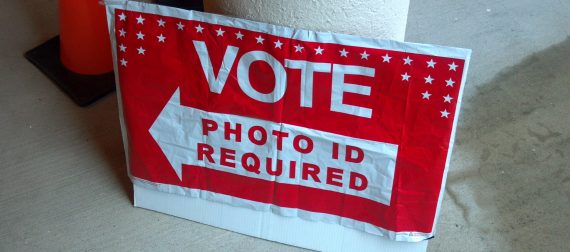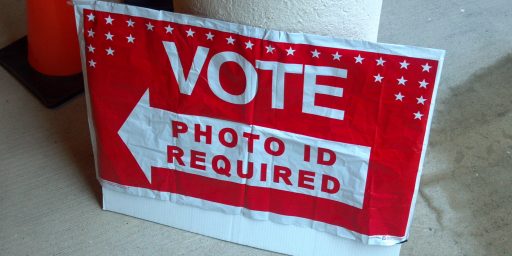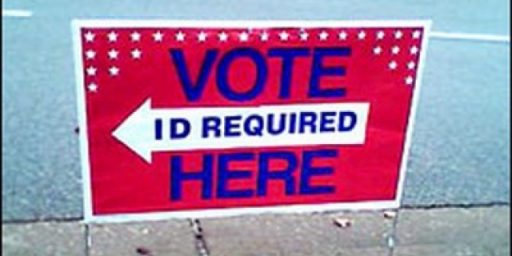Federal Judge Strikes Down Texas Voter ID Law
Texas suffers another legal setback in its effort to pass a Voter ID law.
A Federal District Court Judge in Texas has rejected the revised version of Texas’s Voter ID law, finding that the state’s revisions did not address the problems with the original version of the law and that the law discriminated against African-Americans and other minorities:
HOUSTON — A federal judge blocked Texas from enforcing its revamped voter identification law on Wednesday, ruling that the State Legislature’s attempt to loosen the law did not go far enough and perpetuated discrimination against black and Hispanic voters.
The decision was only the latest chapter in a yearslong court battle over the state’s voter ID rules, and comes amid concerted efforts by the Trump administration to enact tougher voting restrictions. The stakes are particularly high for Texas: As a result of previous court rulings, the state could be forced to undergo federal oversight of its election procedures.
The judge — Nelva Gonzales Ramos, of the United States District Court for the Southern District of Texas — had previously found that the original law, one of the most restrictive in the nation, was passed in 2011 with the intent to discriminate against blacks and Hispanics. It required voters to show one of seven forms of government-issued photo identification, such as a driver’s license or passport, before casting a ballot.
The Republican-controlled Legislature softened the law, in response to legal challenges and court rulings, by allowing potential voters to sign an affidavit and show more widely available types of identification, including a utility bill or a bank statement. The new law, known as Senate Bill 5, was set to take effect in January, despite complaints from critics that it created criminal penalties for those who made false claims about needing to use alternate IDs.
In her ruling, Judge Ramos noted that the retooled law still barred voters from showing state or federal employee ID cards.
Because those who lack the accepted forms of identification were “subjected to separate voting obstacles and procedures,” Judge Ramos wrote, “S.B. 5’s methodology remains discriminatory because it imposes burdens disproportionately on blacks and Latinos.”
On Wednesday, the Democratic lawmakers and civil rights groups that sued Texas over the law hailed the decision as one of several recent court victories in the case. One of the groups involved in the suit, the NAACP Legal Defense and Educational Fund, said Texas had spent at least $3.5 million defending the law as of June 2016.
“Judge Ramos’s decision recognizes that a state cannot escape the consequences of its pernicious conduct without completely eliminating all vestiges of discrimination,” said Kristen Clarke, the president and executive director of the Lawyers’ Committee for Civil Rights Under Law, whose group was one of several that sued Texas.\
A
This isn’t the first time that Texas’s Voter ID law has been considered by a Federal Court, and virtually all of the rulings on this issue have come from the same Federal Judge and affirmed by the Fifth Circuit Court of Appeals. The Texas law had been in limbo since first being passed into law due to the fact that the state was required to get approval for the changes to its voting laws under Section Four of the Voting Rights Act. When the Supreme Court issued its decision in the Shelby County case finding the Justice Departments pre-clearance requirements to be out of date, though, the state announced that the law would go into immediate effect. In response, both the Obama Administration and several private groups filed lawsuits alleging that the law violated other provisions of the Voting Rights Act as well as the Constitution due to its discriminatory impact. In one of those cases, Judge Ramos struck the law down in a wide-ranging opinion that found the law was drafted with a discriminatory intent and that it also had a discriminatory impact due to the fact that it both limited the forms of identification that were accepted at polling places and because of the difficulties that voters faced in getting the proper identification, especially in the more rural parts of the state. Despite that ruling, the law was allowed to stay in effect for the 2014 elections due in no small part to the fact that the ruling came mere weeks before Election Day and existing Supreme Court precedent established that Federal Court orders of this type should strive not to be disruptive of the election process under those circumstances. More than a year later, Judge Ramos’s ruling was affirmed by the Fifth Circuit Court of Appeals, which upheld the findings that there was a discriminatory intent behind the law and that the law also had a disparate impact on minorities. In a subsequent ruling last year, the full Court of Appeals, in an en banc ruling, ruled that the law violated the Voting Rights Act. In that decision, though, the Court of Appeals remanded the case to Judge Ramos with orders to review the issue once again. Earlier this year, Judge Ramos reaffirmed her earlier ruling and found that the law discriminated against minorities both in the intent behind the law and the way that the law was applied. In response to all of this, Texas recently enacted a revised version of the law that it claimed would address the problems the courts had found over three years of litigation. Yesterday’s ruling makes clear that those revisions were not sufficient.
As I’ve noted before, the fact that Judge Ramos found not only that the law had a discriminatory impact but that there was a discriminatory intent behind the law is significant and will likely have an impact on how the case is treated on appeal. As a general rule, the factual findings that a trial judge makes are given significant deference on appeal and the standard for an appellate court to overturn or reject those findings is significantly higher than the standard of review for perceived errors in the interpretation of a statute or provision of the Constitution. The reason for this, of course, is that the trial court has had the opportunity to consider and weigh all the evidence presented to it whereas the appellate court is basically left to consider only the factual record as it was submitted on appeal. Basically, an appellate court will only overturn a factual finding if it is clearly erroneous based the record, a standard which means that those trial court factual findings are usually sustained at the appellate level. Given this, the fact that Judge Ramos made specific factual findings that there was a discriminatory intent behind the law makes it less likely, although not impossible, that her ruling will be overturned on appeal.
Election Law Blog’s Rick Hasen comments;
For two reasons, it matters whether the courts find discriminatory purpose in addition to discriminatory effect. When there is just a discriminatory effect, the remedy is much narrower. In this case, the interim remedy was to tinker with the voter id law, such as allowing voters to file an affidavit explaining why they lack the necessary ID signed under penalty of perjury. With a finding of purpose, however, the entire law could (and today was) thrown out. Second, a finding of intentional discrimination can be the basis, under section 3c of the Voting Rights Act, to put Texas back under the preclearance provisions of the Voting Rights Act for up to 10 years, at the court’s discretion. The court has scheduled further briefing on the section 3c issue for the end of the month.
Today the court reaffirmed the discriminatory purpose finding, and held that the tweaks Texas made to its voter id law in a recent session did not solve the problem of discriminatory purpose. In some ways Texas made things worse. The affidavit requirement, for example, could intimidate voters given that many sections open up voters to prosecutions for felony perjury. The Court also noted that the new law did not include any money for voter education, which the court found crucial to a fairly applied voter id law.
Texas has already announced that it will appeal this ruling to the Fifth Circuit Court of Appeals, and as Hasen notes it’s likely to spend a considerable amount of time there. Because of the volume of cases that Court hears, it will likely be as much as a year before we get a ruling from whatever three-judge panel hears the case and, depending on the outcome of the case, it’s likely that the losing side will choose to seek a rehearing of the case before the entire FIfth Circuit rather than immediately going to the Supreme Court. This would be especially true if the panel’s ruling goes against the State of Texas as it did with the original ruling. This ruling would likely take at least a year on its own. If the law is again struck down at that point, then Texas could choose to either try to revise the law yet again or apply to the Supreme Court for review. As Hasen notes, at that point the main questions will be whether Justice Anthony Kennedy is still on the Court or has been replaced by another Trump nominee and if he is still on the Court whether he agrees with the discriminatory intent findings that numerous Federal Court rulings have found at this point.
More immediately, the legal battle over this law will be concerned with whether or not the law will remain in effect while the case is pending in the Federal Courts. In her initial ruling back in 2014, Judge Ramos had issued an immediate injunction against the application of the law notwithstanding the fact that her ruling was handed down less than a month prior to the election. Texas appealed that injunction to the Fifth Circuit, which lifted the injunction based largely in reliance upon the Supreme Court’s decision in Purcell v. Georgia, a 2006 pre-election stay decision that I’ve discussed before. In that case, the Court held that Federal Courts ought to consider the disruptive effects the granting or denial of a stay on enforcement of an election law would have when such applications are made in the period immediately before an election. The Supreme Court upheld this ruling by the Fifth Circuit, meaning that the law was allowed to remain in effect for the 2014 elections and, presumably, the 2016 elections as well. This time, of course, there is no impending election so the Purcell decision arguably would not apply. This could mean that the injunction will remain in effect while this case makes its way through the Federal Courts.
Here’s the opinion:
Veasey Et Al v. Abbott Et Al Opinion by Doug Mataconis on Scribd






Jeez, Texas, can you get *anything* through your own courts? If you can’t win there, how do you expect to defend your crappy bills in the big leagues?
Well, that’s the entire point of the bill…it’s not really about election integrity. These Texas courts have to get onboard….
Maybe Hurricane Harvey will wipe Texas clean and we can start over again with a clean slate.
I mean, if the Fifth Circuit, of all people, thinks you’re discriminating…
I got caught in the spam filter. Not sure why.
The whole point of Shelby County is to let crappy laws like this affect elections. Thanks, CJ Roberts!
@Daryl’s other brother Darryl: Harvey is hitting the liberal areas hard.
I’m just glad I finally got to a dry place with power and internet (roughly 150 miles in land). I’m down voting your comment as I am very liberal on social matters. I am pro-second amendment with some reasonable restrictions so that might be enough for you to wish me dead…